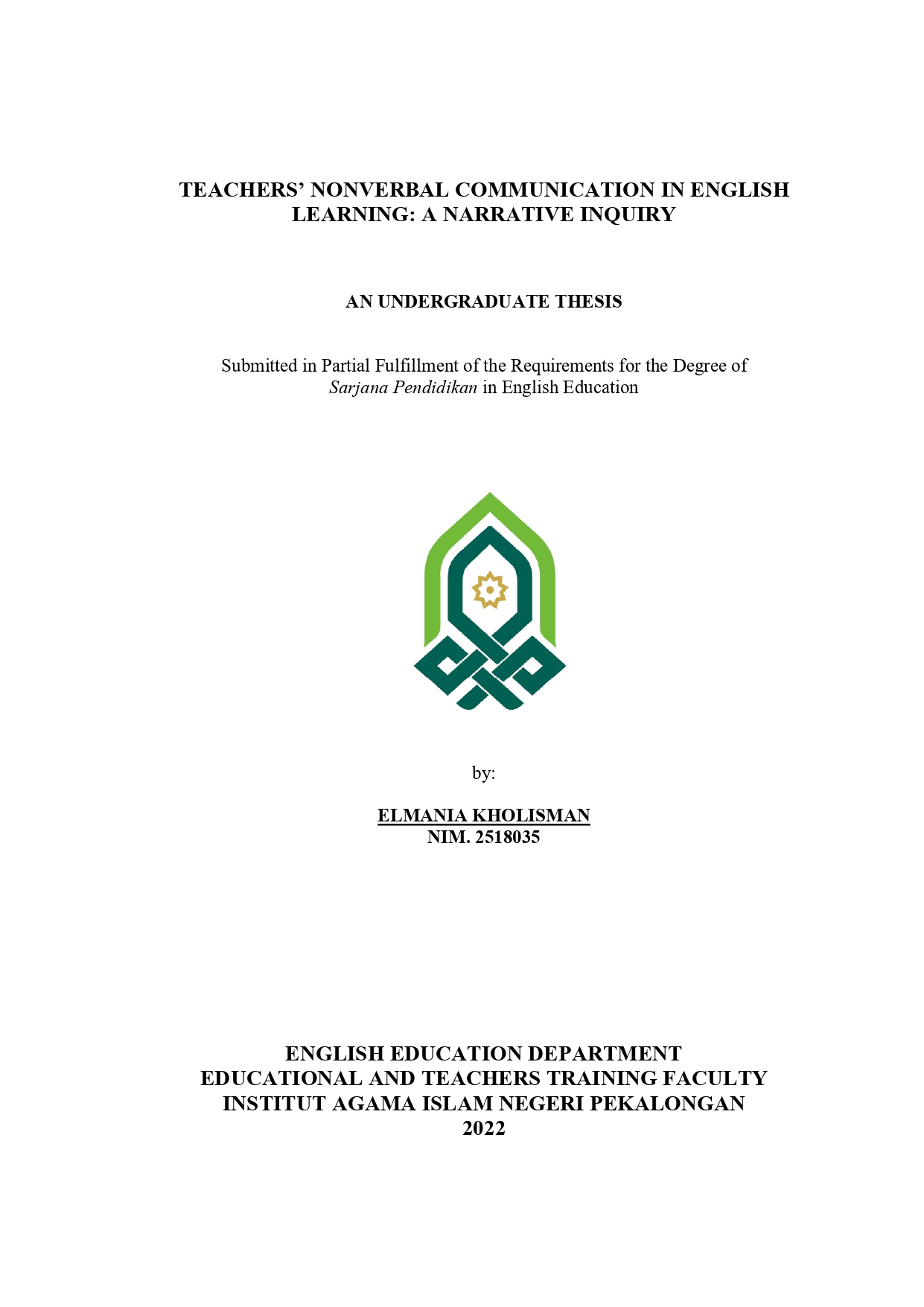
SKRIPSI TADRIS BAHASA INGGRIS
Teachers' Nonverbal Communication in English Learning : A Narrative Inquiry
Nonverbal communication is one of the significant aspects affecting students' motivation in learning, especially in learning English. This study told students’ experience have affected by teacher nonverbal communication in English learning. The research design used in this study is a narrative inquiry. Researchers used triangulation data collection methods through observation and interviews. The data analyzed using thematic analysis by Braun and Clark (2006). The finding for this research showed the forms of teacher nonverbal communication that can motivate students in English learning are kinesics, paralanguage, and proxemics. The result is the narration of the students' experience using nonverbal communication of positive emotions and negative emotions. Positive emotions described the happiness, satisfaction, and comfort of the students following English learning. Positive emotions made students active during study, and pay more attention to the teacher during giving the material. Negative emotions described the student's annoyance and laziness toward the teacher when displaying the expression of murmuring. Negative emotions made students indifferent to teachers during learning and students less enthusiastic during the study.
Keywords: Nonverbal communication; English learning; Students emotion.
REFERENCE
Afdaliah, N. et al. (2017). Teachers’ Nonverbal Communication in EFL
Classroom. Graduate Program, State University of Makasar.
http://eprints.unm.ac.id/id/eprint/6068
Arsini, N. W. N., Sutama, I. M., & Indriani, M. S. (2014). Perilaku Verbal Dan
Nonverbal Guru Ketika Memberikan Penguatan Dalam Pembelajaran
Bahasa Indonesia Di SMP Negeri 1 Singaraja. Jurnal Pendidikan Bahasa
dan Sastra Indonesia Undiksha, 2 (1), 1-10.
Baguelzi, K., Badjenna, A., & Keddouci, O. (2020). Influence of teacher’s nonverbal
communication on EFL students’ speaking performance. Doctoral
dissertation, Master’s Degree in Linguistic/didactics, University of
Ahmed Draia-Adrar.
Bambaeeroo, F., & Shokrpour, N. (2017). The impact of the teachers' nonverbal
communication on success in teaching. Journal of Advances in
Medical Education & Professionalism, 5 (2), 51–59.
Berko, R., Aitken, J. E., & Wolvin, A. (2010). ICOMM: Interpersonal concepts
and competencies: foundations of interpersonal communication. United
Stated of America: Rowman & Littlefield Publishers.
Budiartika, I. N. P., Myartawan, I. P. N. W., & Agustini, D. A. E. (2018).
Verbal and Nonverbal Communication Used by Teachers in Providing
Positive Reinforcement in EFL Classes at SMP N 1 Mengwi. Jurnal
Pendidikan Bahasa Inggris undiksha, 5(2), 11-20.
Budyatna, Muhammad & Leila Mona. (2011). Teori Komunikasi Antarpribadi.
Jakarta : Kencana Media Group.
Cangara, Hafied. (2011). Pengantar Ilmu Komunikasi. Jakarta: PT Raja
Grafindo Persada.
Ketersediaan
| 23SK2325037.00 | SK TI 23.037 ELM t | My Library (Lantai 3. Local Content) | Tersedia |
Informasi Detail
- Judul Seri
-
-
- No. Panggil
-
SK TI 23.037 ELM t
- Penerbit
- Pekalongan : Jurusan S-1 Tadris Bahasa Inggris FTIK UIN K.H. Abdurrahman Wahid Pekalongan., 2022
- Deskripsi Fisik
-
xii, 50 hlm., 30 cm; Bibliografi: 51-54
- Bahasa
-
Inggris
- ISBN/ISSN
-
-
- Klasifikasi
-
302. 222
- Tipe Isi
-
-
- Tipe Media
-
-
- Tipe Pembawa
-
-
- Edisi
-
-
- Subjek
- Info Detail Spesifik
-
-
- Pernyataan Tanggungjawab
-
Elmania Kholisman (2518035)
Versi lain/terkait
Tidak tersedia versi lain
Lampiran Berkas
Komentar
Anda harus login sebelum memberikan komentar
 Karya Umum
Karya Umum  Filsafat
Filsafat  Agama
Agama  Ilmu-ilmu Sosial
Ilmu-ilmu Sosial  Bahasa
Bahasa  Ilmu-ilmu Murni
Ilmu-ilmu Murni  Ilmu-ilmu Terapan
Ilmu-ilmu Terapan  Kesenian, Hiburan, dan Olahraga
Kesenian, Hiburan, dan Olahraga  Kesusastraan
Kesusastraan  Geografi dan Sejarah
Geografi dan Sejarah